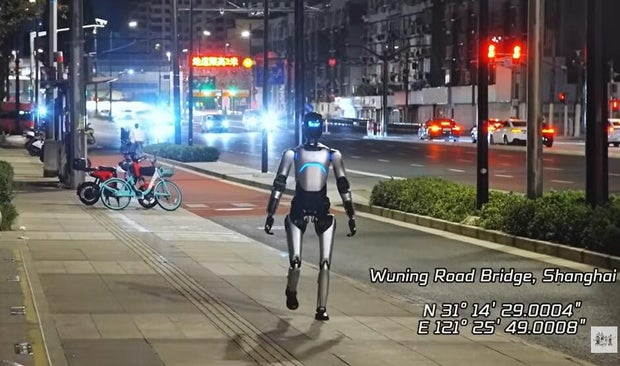Shanghai — A Chinese robot has stepped into the Guinness World Records after completing a three-day, 66-mile trek, the longest reported distance ever walked by a humanoid machine.
The AgiBot A2, which stands about five feet and six inches tall, set off from the eastern Chinese city of Suzhou on the evening of November 10, traversing highways and city streets before arriving at Shanghai’s historic waterfront Bund area on November 13, according to Guinness World Records.
Shanghai-based robot maker AgiBot said its two-legged ambler “navigated varied surfaces … all while adhering to traffic regulations” during its continuous 66-mile journey, which was certified as the first feat of its kind on Thursday.
Video clips published by AgiBot showed the silver-and-black A2 trudging along a road past cyclists and scooters, before picking up its pace and marching down the Bund in front of the Shanghai skyline.
AgiBot/YouTube
The world’s tech firms are pouring massive sums into physical AI, with Morgan Stanley predicting that the world could have more than a billion humanoid robots by 2050.
The Chinese government has encouraged domestic firms to develop humanoids, in the hopes of leading the global robotics industry.
Beijing hosted the world’s first-ever humanoid robot games in August, where more than 500 “athletes” vied in disciplines ranging from basketball to competitive cleaning.
AgiBot says the A2 is designed for customer service roles, and is equipped with a chat function and lip-reading capabilities.
Earlier this year, “CBS Mornings” spoke with engineers at the Massachusetts Institute of Technology who are working to keep America in the robotics race.
“I like to think about AI and robots as giving people superpowers,” said Professor Daniela Rus, who leads MIT’s Computer Science and Artificial Intelligence Lab. “With AI, we get cognitive superpowers … On the physical side, we can use machines to extend our reach, to refine our precision, to amplify our strengths.”
“CBS Mornings” cited research and advisory firm Gartner’s estimate that by 2030, 80% of Americans will interact daily in some way with autonomous, AI-powered robots.




